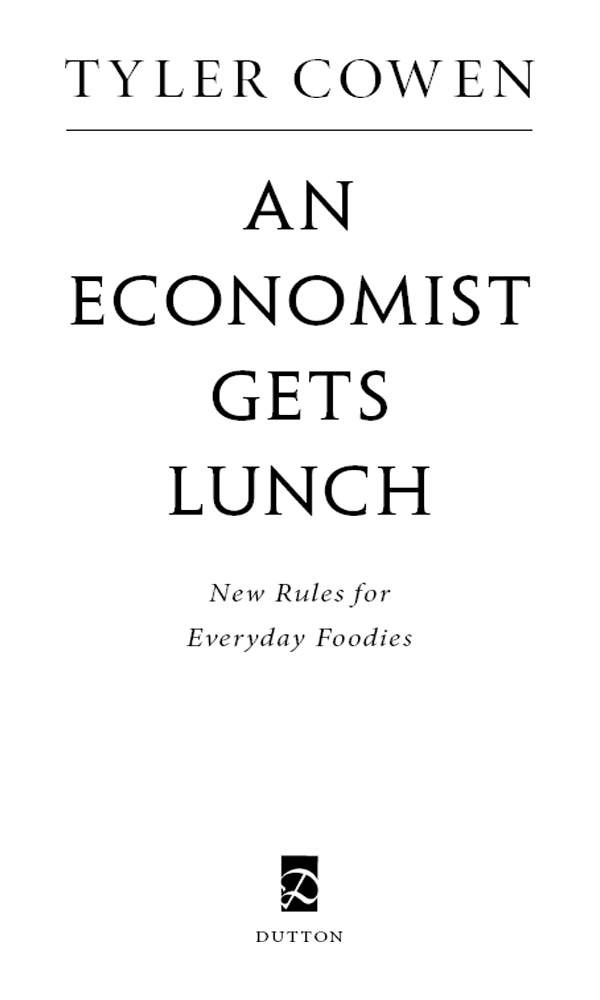
An Economist Gets Lunch
New Rules for Everyday Foodies
کتاب های مرتبط
- اطلاعات
- نقد و بررسی
- دیدگاه کاربران
نقد و بررسی

Starred review from February 6, 2012
Enlightened consumerism, not ideology, is the surest path to tasty and responsible dining, argues this yummy gastronomic treatise. Economist and restaurant critic Cowen (The Great Stagnation) takes readers along as he eats, shops, and cooks in a diversity of spicy settings, including a Nicaraguan tamale stand, the greens aisle at the Great Wall supermarket chain, backwoods barbeque pits, and his own kitchen, where he wrestles with Mexican cuisine. He focuses on how the interplay between creative suppliers and demanding customers produces good, cheap food, an approach that yields offbeat insights into, for example, why the menu item that sounds the least appetizing usually tastes great and why you should never eat in a place filled with beautiful people having a great time (that restaurant’s specialty, he reasons, is the scene, not the food). Cowen also offers a telling contrarian critique of high-minded food orthodoxies that extols agribusiness, debunks the environmental benefits of locavorism, and toasts genetically modified organisms. Cowen writes like your favorite wised-up food maven, folding encyclopedic knowledge and piquant food porn—“the pork was a little chewy but flavorful, and the achiote sauce gave it a tanginess”—into a breezy, conversational style; the result is mouth-watering food for thought.

March 15, 2012
Food and economics meet in this entertainment by celebrity economist Cowen (The Great Stagnation: How America Ate All the Low-Hanging Fruit of Modern History, Got Sick, and Will (Eventually) Feel Better, 2010, etc.). A celebrity economist? Yes, for Cowen is widely hailed for his smarter-than-freakonomics, libertarian-inclined economics blog Marginal Revolution on one hand and his D.C.-centric blog Tyler Cowen's Ethnic Dining Guide on the other. Here he blends the best of both those worlds. If you've heard of the free-rider problem in economics, where leeches benefit from the productivity of others, then here's a twist: "the wealthy and the myopic are the friend and supporter of the non-drinking gourmand." In other words, the knowing customer may well choose to avoid drinking anything other than water, knowing both that the markup on alcohol and soda is astronomical and that those who buy such things effectively lower the tariff on the price of a meal, where the margins are slimmer. In economic terms, this "price discrimination" favors the teetotaler, and with nary a hint of moralizing. Cowen stops short of formulas and equations, but there's plenty of hard, old-fashioned economic thinking in these pages--e.g., the power of immigration to improve cuisine and the bewildering array of food choices we have today as one of the blessings of free-market capitalism. Cowen is also prepared to go into the fray as a mild-mannered version of Anthony Bourdain. He writes that one shouldn't Google "Best restaurants Washington" but instead "Washington best cauliflower dish" if one wants to escape the awfully ordinary, and he counsels that the best barbecue is to be found in small towns in joints that open and close early. The narrative gets a touch repetitive at points, but if you're a foodie with a calculator, this is your book.
COPYRIGHT(2012) Kirkus Reviews, ALL RIGHTS RESERVED.

November 1, 2011
Get ready for a shock: local food may taste better, but it's not necessarily better for the environment. And food that is cheap is not necessarily bad for you. Probably no one knows this better than Cowen, author of the New York Times best-selling ebook The Great Stagnation, the big economics blog Marginal Revolution, and the foodie blog Tyler Cowen's Ethnic Dining Guide. Lots of interesting topics, e.g., why packed restaurants serve iffy fare, and who can complain about better-tasting, cheaper, more environmentally friendly food?
Copyright 2011 Library Journal, LLC Used with permission.

April 15, 2012
Drawing on his own broad experience, Cowen steers his audience through the contemporary world of eating and drinking. Like many staunch foodies, he respects the local. He much prefers the tamales from a roadside vendor in Nicaragua to those offered in a tourist restaurant. Not only does the roadside vendor produce a tastier product; the food is also less processed and less depleting of energy spent on transportation. Cowen finds that, despite what logic may suggest, the most expensive food is not necessarily the best. And he reveals that the same principle holds true in urban America as well as in the Third World. He expands this insight with a survey of barbecue restaurants in the U.S. His contention that Thai food in America has become too sweet and thus inferior will provoke discussion. Cowen offers more anecdotes and fewer metrics here, remarkable for a book written by an economist.(Reprinted with permission of Booklist, copyright 2012, American Library Association.)

























دیدگاه کاربران